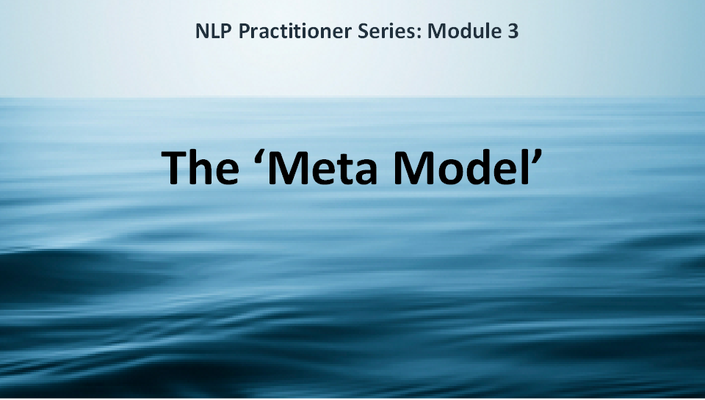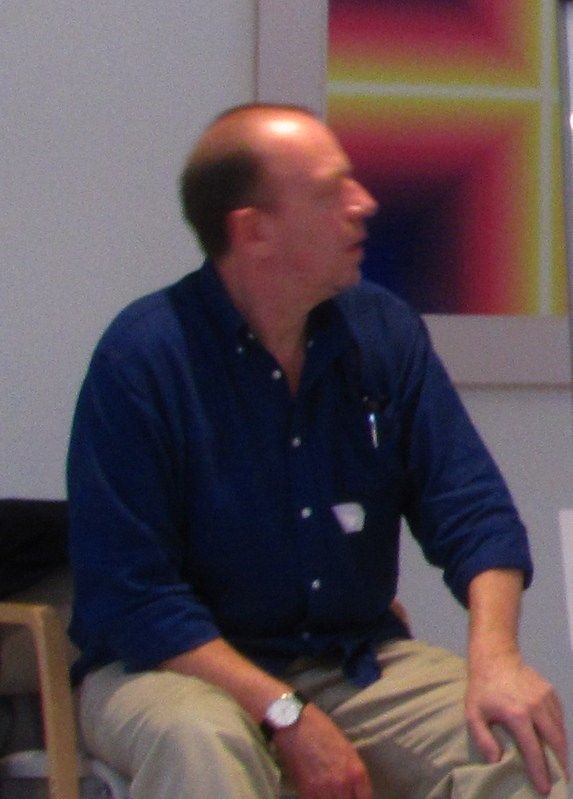
NLP Practitioner Module 3: The 'Meta Model'
How we make sense of the world through the words we use - the 'L' of NLP
The NLP Practitioner series uses edited video footage of the taught content of a 20 day programme held over 10 x 2 day monthly modules.
The series begins with the Foundations Programme (Modules 1 & 2), introducing the principles that underpin NLP, and the foundation skills and techniques. People new to NLP are recommended to watch these modules before progressing further.
Each subsequent Module of the Practitioner series focuses on a particular topic.
This Module 3 introduces the L (Linguistic) of NLP, looking at how we make sense of the world through the language we use, and how we can challenge unhelpful thinking with the right questions. Content includes ....
~ the concept of 'Chunking', as a way of understanding the level of detail or generality used when communicating.
~ Levels of 'Internal Thinking', explaining sensory based thinking and thinking in words, and introducing the notion of 'Meta States', what we think and feel about what we think and feel.
~ the 'Meta Model', and the processes of Deletion, Generalisation and Distortion that we use to go from Deep Structure (the totality of our experience) to Surface Structure (the words we use).
~ Meta Model responses to use in response to unhelpful Deletions, Generalisations and Distortions.
Module 4 stays with the language theme, with day 1 exploring ways of accessing our unconscious resources, and day 2 exploring the use of stories and metaphor.
Module 5 looks at time and timelines, how negative memories from the past can be released, and includes the NLP phobia cure technique.
Module 6 (1 day taught content only) includes some additional anchoring techniques. Day 2, (not included on the video), involves a full day integration exercise, where participants work in threes practising what they have learnt so far.
Module 7 is an introduction to Modelling, the methodology that underpins NLP. It includes the Spelling Strategy, and the SWISH technique (an approach to deal with unwanted habitual behaviour) as examples of techniques that have come from modelling.
Module 8 introduces the Disney Creativity Strategy, leads into 'Parts' as a metaphor for unconscious decisions and patterns, and introduces techniques for working with Parts.
Module 9 explores Beliefs, and ways of identifying, working with, and changing limiting beliefs.
Module 10 (not included in the video) is the integration and certification weekend, where participants work in threes practising their skills with each other.
NLP (Neuro Linguistic Programming) is a very effective approach to psychology, communication and performance, based on the study of people who naturally do things well. Together, the Foundation Diploma and Practitioner video series share many of the frameworks and techniques that make NLP such a useful approach.
This video series is suitable for people who have already experienced some training, or watched the Foundation Diploma content. Those with experience can revisit the material, fill in any gaps, deepen their understanding, and perhaps find more ways of explaining NLP to others.
While the programme will help you to develop your understanding and knowledge of NLP, for skill development, there is no substitute for the opportunities to practice and get feedback that live training courses offer.
For more information about our training, or about other products, please visit our website nlpinthenorthwest.co.uk
Your Instructor

Founder and lead trainer of NLP in the Northwest, Chris has been fascinated by people, what makes us 'tick', get on with each other (or not) , and what affects our behaviour and performance, since his teenage years.
He has spent over 40 years enthusiastically exploring and studying our 'psychology', relationships and effectiveness. With over 25 years experience in training and coaching, Chris has looked for the 'difference that makes the difference' to find simple models and effective techniques and strategies that make sense, are easily learnt, and work in practice.
Chris has qualifications in psychology, social work and organisational analysis & behaviour, and has been a certified NLP trainer and Master Practitioner for over 20 years. He has a reputation for making things easy to understand, and for training with heart, humour and integrity. Chris lives in Lancashire, UK, with his wife Glenda, who is equally passionate about people, learning and wellbeing.
